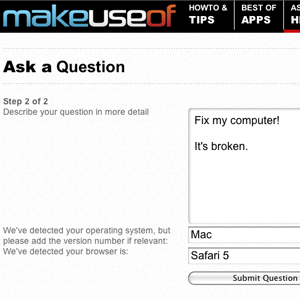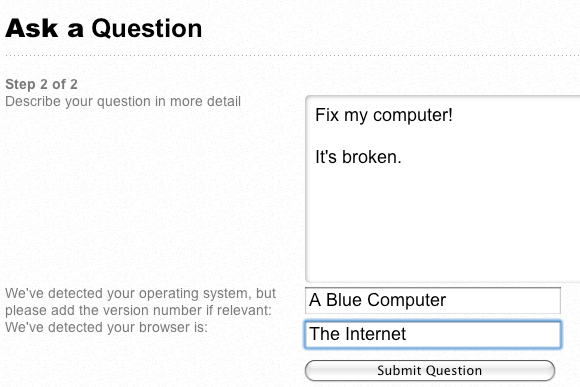Do you want quality responses to your questions online? Ask quality questions. What are quality questions? They're friendly, relevant, to-the-point and provide enough information that the question can actually be answered.
Google's amazing search function has changed all our lives for the better, but sometimes finding answers to a particular question works better if you can ask a fellow human being.
If you want quality answers to your queries, however, there's one principle you need to know - (almost) everything you see on the Internet is written by an actual human being. There aren't magic robots out there solving your problems for you–there are only living, breathing people with lives and concerns of their own. If you remember this as you write your question you'll probably get the response you're looking for.
Do I know everything about asking quality questions? No. But I've been around the Internet a couple of times, and I've seen what gets results. Here's a bit of humble advice along those lines.
Learn The Culture
If you're at a dinnner party with a group of people you don't know, it's probably a bad idea to try dominating the conversation without listening. You need to figure out the pace, the tone and the kinds of topics your new friends enjoy.
The same thing applies on the Internet–"lurk moar", as the old saying goes. It's a good idea to hang around a particular website for a while before commenting, so you can learn the flow of the site along with any cultural pecularities.
This is hard to outline concretely, because every online community is different. For example, if you're asking a question at the Ubuntu Forums, don't start by saying how Windows is way better than Ubuntu and that you will switch back unless someone solves your problem INSTANTLY. It isn't helpful.
Learn what sorts of questions get answers on a given site before you start asking them. This isn't just polite; it's practical. Asking about user issues on a site dedicated to programmers rarely helps; learn about the site you're using before you ask a question.
Another example - there are unwritten rules for posting on Reddit. Learn them before you even try, but even that won't be enough. On certain sub-sections of Reddit, being hilarious is the most important thing; others are full of people who love answering questions about things they're passionate about. Learn the difference if you want to ask for relevant information.
Search First; Repeat. If Necessary, Ask.
Some topics of conversation come up again and again. Don't be the person who brings up a particular question for the umpteenth time. Always search a site for your question before asking it. It's common courtesy online, because it shows you value the time of the people you're requesting information from.
Do you not see a search function on a given site? Use Google. Type your search, then follow it with "site:makeuseof.com". This function will only show you results from "makeuseof.com", but you can obviously use it for any website. Check out this PDF for more search engine tips.
Can't find an answer to the question on the site where you're asking? Try a general Google search as well. The information you're looking for could well be easy to find, meaning questions about them can frustrate members of certain online communities.
Simply put - don't waste people's time with things you can easily find out yourself. If you do, they probably won't bother to respond.
3. Provide Enough Information
Asking a question is useless if you don't provide enough information for people to answer. For example:
My computer won't start. What should I do?
No one will ever answer this question, and if they do the answers will only be requests for more information. Remember - the people you're asking for help are actual human beings. They can't read your mind, and they have no idea what your situation is, so provide information about that situation if you want a response.
In the example above, relevant information includes:
- What kind of computer it is that won't start, complete with specs if you have them.
- Which operating system you're trying to start. Windows? OS X? Some kind of Linux?
- Whether anything unusual happened before the computer stopped booting. Did you install any weird software, or pour vodka on your keyboard?
You get the idea - provide context or people will be unable to answer your question.
Are you not sure what information is and isn't relevant? Remember the above point - learn the culture of the community you're interacting with. Check out previous threads and see which questions received answers. Aim to be equally informative.
4. Be Positive
Do you want to get a writer's attention in the comment section of any blog? Thank him or her for a job well done. Comment sections across the net are typically filled with so much vitriol that a single positive statement below an article will stand out almost immediately, especially if the comment addresses the content of the article.
The same goes for online forums - being polite and complimenting a community before asking a question almost always helps, if the compliment comes across as sincere.
Of course, there's one way you could screw this approach up - leaving a positive comment so generic people assume you are a spambot. Comments that provide no context, just generic praise, rarely result in useful answers. For example:
This is a quality Internet site and/or community you have here. I will visit frequently. Hey, can you fix my computer for me?
It all comes back to my first point - learn the ins and outs of a particular community before you start asking questions. An irrelevant compliment is practically an insult, because it reveals you never bothered to read any of the content on the site.
5. Don't Just Take; Give
Finally - never simply use a community. Join a community. Don't be that guy who always takes and never gives: contribute to the online communities that help you by answering other people's questions.
After all - if everyone just asked questions without answering them, there would be no answers.
But, But...That's All Too Much Work!
If you are thinking to yourself "this is too much work, and I'm not going to bother," know this - people will feel the same way about the questions you ask. Like I keep saying, the people on the Internet are every bit as human as you, and will act accordingly.
Happily most people are fantastic if you treat them with respect. The above rules aren't set in stone. They're just my guidelines for being respectful online. Following them won't guarantee you free tech support, but they will make it more likely that strangers put aside their valuable time and try to help you out.
Can you think of any other other etiquette rules for asking questions online? Leave them in the comments below, because I love learning from you.




